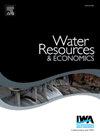Water resource tax policy and micro environmental performance improvement in China's water-intensive industries
IF 1.9
3区 经济学
Q2 ECONOMICS
引用次数: 0
Abstract
The rapid industrialization of developing countries has led to irrational water usage and over-exploitation, exacerbating global water scarcity. While resource tax represents a well-established policy instrument, its micro-level effectiveness in water resource management remains empirically understudied. This paper employs differences-in-differences method to comprehensively evaluate the impacts of China's water resource tax on environmental performance improvements of micro-enterprises. With a panel data from 456 listed firms in water-intensive industries in China from 2012 to 2022, this paper finds that water resource tax significantly enhances environmental performance, with green innovation serving as a crucial mediating mechanism. By uniquely controlling for concurrent water pollution charging systems, our analysis reveals the comparative advantage of tax-based approaches. The results demonstrate pronounced heterogeneous effects: the policy's impact is most significant in the mining sector, followed by manufacturing, while showing negligible effects in power and electricity sectors. Additionally, non-state-owned enterprises and small-scale firms exhibit stronger environmental improvements. This study contributes existing literature by providing robust micro-level evidence of water resource tax effectiveness, employing current official classifications of water-intensive industries to avoid policy impact underestimation, and establishing robust causal relationships through rigorous econometric testing. These nuanced findings provide insights for policymakers in developing nations facing water resource challenges, offering an evidence-based blueprint for implementing targeted regulatory approaches and calibrating sector-specific environmental policies.
水资源税政策与中国水密集型产业微观环境绩效改善
发展中国家的快速工业化导致了不合理的用水和过度开发,加剧了全球水资源短缺。虽然资源税是一项行之有效的政策工具,但其在水资源管理方面的微观有效性仍未得到实证研究。本文采用差中差法对中国水资源税对微型企业环境绩效改善的影响进行了综合评价。本文利用2012 - 2022年中国456家水密集型行业上市公司的面板数据,发现水资源税显著提高了环境绩效,其中绿色创新是重要的中介机制。通过对并行水污染收费系统的独特控制,我们的分析揭示了基于税收的方法的比较优势。结果显示出明显的异质性效应:该政策对采矿业的影响最为显著,其次是制造业,而对电力和电力部门的影响微不足道。此外,非国有企业和小型企业表现出更大的环境改善。本研究为水资源税有效性提供了强有力的微观证据,采用现行的官方水资源密集型行业分类以避免政策影响低估,并通过严格的计量检验建立了强有力的因果关系,从而对现有文献做出了贡献。这些细微差别的发现为面临水资源挑战的发展中国家的决策者提供了见解,为实施有针对性的监管方法和校准特定部门的环境政策提供了基于证据的蓝图。
本文章由计算机程序翻译,如有差异,请以英文原文为准。
求助全文
约1分钟内获得全文
求助全文
来源期刊

Water Resources and Economics
Environmental Science-Water Science and Technology
CiteScore
5.00
自引率
0.00%
发文量
17
审稿时长
51 days
期刊介绍:
Water Resources and Economics is one of a series of specialist titles launched by the highly-regarded Water Research. For the purpose of sustainable water resources management, understanding the multiple connections and feedback mechanisms between water resources and the economy is crucial. Water Resources and Economics addresses the financial and economic dimensions associated with water resources use and governance, across different economic sectors like agriculture, energy, industry, shipping, recreation and urban and rural water supply, at local, regional and transboundary scale.
Topics of interest include (but are not restricted to) the economics of:
Aquatic ecosystem services-
Blue economy-
Climate change and flood risk management-
Climate smart agriculture-
Coastal management-
Droughts and water scarcity-
Environmental flows-
Eutrophication-
Food, water, energy nexus-
Groundwater management-
Hydropower generation-
Hydrological risks and uncertainties-
Marine resources-
Nature-based solutions-
Resource recovery-
River restoration-
Storm water harvesting-
Transboundary water allocation-
Urban water management-
Wastewater treatment-
Watershed management-
Water health risks-
Water pollution-
Water quality management-
Water security-
Water stress-
Water technology innovation.
 求助内容:
求助内容: 应助结果提醒方式:
应助结果提醒方式:


